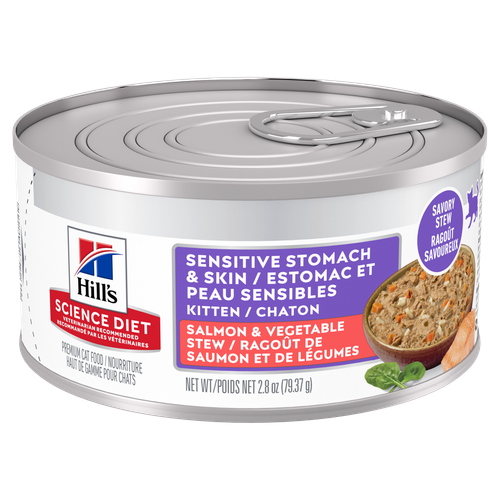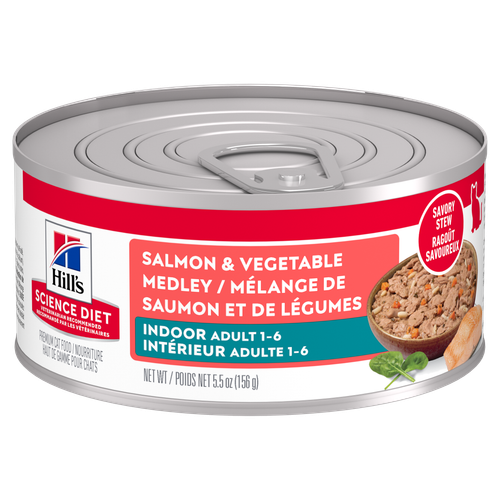
-
Find the right food for your petTake this quiz to see which food may be the best for your furry friend.Find the right food for your petTake this quiz to see which food may be the best for your furry friend.Featured products
 Sensitive Stomach & Skin, assortiment de conserves
Sensitive Stomach & Skin, assortiment de conservesHill's Science Diet Sensitive Stomach & Skin Variety Pack
Shop Now Adult Perfect Weight & Joint Support Hearty Vegetables and Tuna Stew Dog FoodShop Now
Adult Perfect Weight & Joint Support Hearty Vegetables and Tuna Stew Dog FoodShop Now Healthy Cuisine, Adulte, assortiment de conserves
Healthy Cuisine, Adulte, assortiment de conservesHill's Science Diet Healthy Cuisine Variety Pack
Shop NowFeatured products Kitten Sensitive Stomach & Skin Salmon & Vegetable Stew
Kitten Sensitive Stomach & Skin Salmon & Vegetable StewSupports kitten growth, digestive health, nourishes skin and promotes a lustrous fur
Shop Now Adult Indoor Salmon & Vegetable Medley Cat Food
Adult Indoor Salmon & Vegetable Medley Cat FoodPrecisely balanced nutrition for indoor cats with the delicious taste of savory salmon and vegetables
Shop Now Adult Urinary Hairball Control Savory Chicken Entrée cat food
Adult Urinary Hairball Control Savory Chicken Entrée cat foodSupports the health of the whole urinary system with optimal levels of magnesium
Shop Now -
Dog
- Dog Tips & Articles
-
Health Category
- Weight
- Food & Environmental Sensitivities
- Urinary
- Digestive
- Joint
- Kidney
- Dental
- Cancer
-
Life Stage
- Puppy Nutrition
- Adult Nutrition
- Senior Nutrition
Cat- Cat Tips & Articles
-
Health Category
- Weight
- Skin & Food Sensitivities
- Urinary
- Digestive
- Kidney
- Dental
- Stress
- Cancer
-
Life Stage
- Kitten Nutrition
- Adult Nutrition
Featured articles The Incredible Science Behind Your Pet's Microbiome
The Incredible Science Behind Your Pet's MicrobiomeLearn what a pet's microbiome is, how it contributes to your pet's gut & overall health, and why nutrition is important in maintaining healthy microbiomes.
Read More Pet Food Storage Tips
Pet Food Storage TipsDiscover how and where to store your dry, as well as canned, dog and cat food. Learn how to find the "best before" dates on all Hill's pet food packaging.
Read More Compare Your Pet Food's Calories to Other Brands
Compare Your Pet Food's Calories to Other BrandsCompare Hill's Science Diet dog and cat food's calories against other pet food brands and AAFCO recommended maximum calorie count.
Read More -
Stress in cats
Stress in cats
What causes stress in cats?
While GI or urinary issues are noticeable, cats are likely also experiencing stress hiding in plain sight. There are multiple factors that can cause stress.
- Changes in the home environment
- Inconsistency in routine
- Underlying health condition or pain
Be sure to monitor your cat’s behavior and note any changes to discuss with your vet if you suspect your cat is stressed.


What are the hidden signs of stress?
Even when the signs are visible, it’s easy to overlook a pet’s hidden stress. Urinary signs are the most noticeable of hidden stress signs, so you might be wondering if your cat is stress peeing or if stress can cause urinary problems. If you notice any of these signs, it’s important to make an appointment with your veterinarian.






Managing your pet’s stress
If you suspect your cat is stressed, the first step should be a visit to your veterinarian. They can provide you with guidance and information about how to manage stress in cats. Along with information, they may recommend nutrition or medication to help manage your cat’s stress.


Routine
Providing your cat with consistency can help alleviate some stress. Making sure their litter box is clean and that they have access to plenty of fresh water can help reduce a cat’s stress urination. If you’re looking to calm your stressed cat at home, here are 10 tips to help manage your cat’s stress.


Medication
In addition to behavioral and environmental accommodations, a vet may prescribe medication to help manage your cat’s stress. If you are looking for medications to give your cat, consult with your vet first. Over-the-counter medications should only be used as recommended by your vet.


Nutrition
With the right ingredient blend, your cat’s food can help reduce a cat’s stress. Vets may recommend Hill’s Prescription Diet or Science Diet to help manage signs of stress long-term to improve the quality of life for cats.


Finding the right nutrition to help reduce stress
A veterinarian may recommend therapeutic nutrition as part of a comprehensive plan to help manage a cat’s stress. Hill’s Prescription Diet stress varieties share the same ingredients to make a visible difference in pets experiencing stress.
Proven stress-reducing ingredients
- L-tryptophan acts as a mood balancing ingredient to enhance a stressed cat’s mood
- Milk protein hydrolysate decreases fearfulness & increases contact with people¹
- Omega-3 fatty acids & antioxidants help support the body’s response to stress
¹Beata et al. J Vet Behavior 2007;2:40-46
Ask your vet for a recommendation
Prescription Diet foods offer therapeutic nutrition for a range of health issues — including cats with signs of stress. They’re clinically tested and developed by a team of PhD nutritionists and veterinarians, so you can rest assured your pet is receiving premium nutrition backed by science.
If your cat has signs of stress, schedule an appointment with your vet and ask how Prescription Diet or Science Diet can help.
Ask your vet for a recommendation
Prescription Diet foods offer therapeutic nutrition for a range of health issues — including cats with signs of stress. They’re clinically tested and developed by a team of PhD nutritionists and veterinarians, so you can rest assured your pet is receiving premium nutrition backed by science.
If your cat has signs of stress, schedule an appointment with your vet and ask how Prescription Diet or Science Diet can help.

